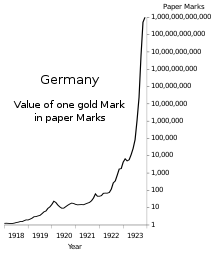So that everyone is clear when I make any comparison between Hitler and Trump, there are obvious difference. Trump is not going to annex the Ruhr and the Sudentenland, invade Poland or kill 6 million Jews.
Both men represent answers for countries in paroxysms of self-doubt, but you have to understand that Germany by the 1930s was in VASTLY worse shape than the United States is today. Germany lost 2 million men in World War I, when it had a population of 64 million people. To have the same percentage of casualties in a war today, the United States would have to lose TEN MILLION MEN. Less than a million men have died in all American wars. So wrap your head around a war where nearly every day for 4 years you looked in the paper expecting to see the name of someone you knew as a casualty.
And then imagine what it was like in the field for the German soldier. Adolf Hitler was a soldier, and by all accounts a brave, if not exceptional one. Imagine coming home from a war where you saw most young men your age get killed. Then imagine when you got home you discovered your country had signed a treaty crippling it was massive war reparations that would be paid over 40 years. It's not hard to imagine feeling boiling rage.
Germany's solution to war reparations was to simply print more more money, which drastically reduced the value of money in circulation. True, they were paying back their creditors with worthless money, but it was the same worthless money that its citizens needed for transactions in their daily lives.

Money became worthless. People who owned things, like factories or business still had their capital, but if you were a salaried person of the middle class, you were sunk. The hyperinflation destroyed the middle class in a period of a few years.
What we are experiencing here in the United States has been a slow erosion of the middle class over decades. It has been a sizable drop, and middle class equity was certainly seriously injured in the Mortgage crisis of 2008, but nowhere as dramatic and pervasive as the hyperinflation in Germany.
So both countries are dealing with hits to their middle class, but the hit to the U.S. middle class is nowhere near what it was in the Weimar Republic. And the middle class is the center of the country. When the middle class gets smaller, the class differences between rich and poor are exacerbated, and the country becomes more polarized. In our country the Democratic and Republican parties have become more liberal and conservative respectively. In the Weimar Republic, there were pitched battles between Fascists and Communists in the streets. Imagine clashes like the one in Charlottesville being common events. So when you think of the political choices in Germany, don't think liberal or conservative, think Alt-Right and Antifa, only worse.
But the United States has a lot going for it as opposed to the Weimar Republic. The first official act of the Weimar Republic was to sign the Treaty of Versailles, which was both economic ruin and national shame for Germany. The German people did not have 200 years of democratic tradition to guide them. Democracy was new, and the Weimar Republic will always be associated with the shameful treaty. Life under the Kaiser had for the most part been a lot better than life under the Weimar Republic. So for Germans, going to a totalitarian government was not a huge break in their history.
So while I see the style of Trump and Hitler being similar in appealing to the worst fears of their followers, the countries, cultures and the realities of political and economic history are vastly different. We're seeing similar kinds of Nationalism in response to a perceived threat against the Nation by a significant portion of the population. And again, this nationalism is forged in the fire at the heart of a very different nation. But both Trump and Hitler are tribalists, whether building a thousand year Reich or Making America Great Again.

